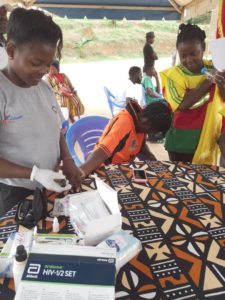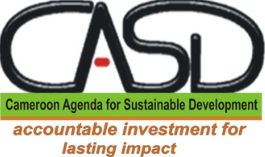 Despite the civil war that has killed over 3,000 people and displaced 60,000 inhabitants of the project site, the girls’ ice cream parlor remained the safest space for girls to access quality sexual and reproductive health information and services in the North West Region of Cameroon. The project’s popularity grew among adolescents, and strangely among other community members not just for its novelty in delivering SRH services but also for the bravery of its staff in rendering services during the political and humanitarian crisis. Gunshots caused the staff to pass nights in bushes, weekly ghost days reduced working hours, and members of staff were targeted for harm; yet, 6,715 adolescents were served this year.
Despite the civil war that has killed over 3,000 people and displaced 60,000 inhabitants of the project site, the girls’ ice cream parlor remained the safest space for girls to access quality sexual and reproductive health information and services in the North West Region of Cameroon. The project’s popularity grew among adolescents, and strangely among other community members not just for its novelty in delivering SRH services but also for the bravery of its staff in rendering services during the political and humanitarian crisis. Gunshots caused the staff to pass nights in bushes, weekly ghost days reduced working hours, and members of staff were targeted for harm; yet, 6,715 adolescents were served this year.
Adolescents were reached and served in the few schools that were functional, markets, churches, and on the streets. Remarkable during this phase was the expansion of the project to the West Region, home to thousands of internally displaced adolescents from the North West Region. Every beneficiary received the My Life, My Choice brochure containing age-appropriate family planning facts and a phone hotline number. Those with contact numbers received at least one follow-up message through SMS. Informed contraceptive choices were accessed without fear, stigma, or coercion on the ice cream truck and at partner health facilities. To widen the reach and encourage uptake of modern contraceptives among adolescents, the kits were donated to some partner health facilities that provided them to their adolescent clients for free. This strategy was welcomed by the health facilities that expressed financial constraints in meeting service requests by adolescents.
At the close of this project year, almost every adolescent within the targeted communities was aware and familiar with the services offered by the project which they nicknamed “Girls’ Choice.” Quite noticeable was the fact that our beneficiaries were bolder discussing SRH issues with their peers, able to clarify them with the right information, and when in doubt consult us for a better understanding of subjects that arose during arguments. During field activities, they encouraged their shy peers who had not benefited from the services too. As trust and confidence in confidentiality were built over the years, some beneficiaries who presented with signs and symptoms of sexually transmissible infections (STIs) felt reluctant when referred to health facilities for diagnosis and treatment as they would have preferred to do so at CASD.
The goal moving forward would be to strengthen access among the beneficiaries, improve the quality of service in consideration of their evolving capacities, and enroll the children who just turned adolescents.
The facts and myths about weight gain and infertility caused by contraceptive use remained a big challenge among the beneficiaries. The fragility of health structures amidst the geopolitical crisis exacerbates adolescents’ vulnerability to unplanned pregnancies. All these challenges buttress the need for the project’s continuation
